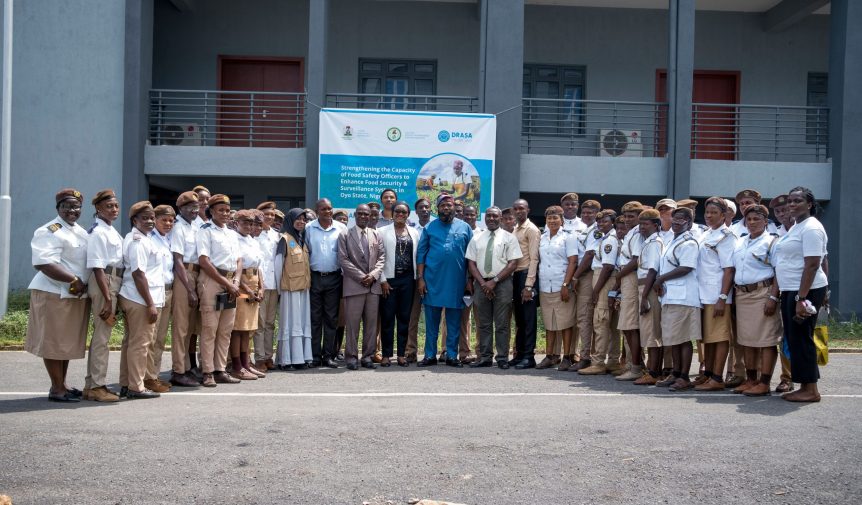"Out of 600 million of the world population that fall sick in a year from food-borne diseases, Nigeria produces about 173 million of those cases, which is up to 29% of that share in the whole world." - Dr. Andy Ukah, Associate Professor and Facilitator, SCF Project.
Infectious diseases do not respect status or class. Whether you only engage in fine dining or patronize roadside/street food vendors, Food contamination can occur if proper food safety practices are not followed. Over the years, Nigeria has made significant progress in addressing food safety issues with the 2022 National Policy on Food Safety and its Implementation Strategy; however, existing food safety surveillance systems are fragmented and poorly coordinated, making it difficult to track, report, and mitigate food safety risks on time.
To help improve food safety practices in Nigeria, DRASA in collaboration with the Oyo State Ministry of Environment and Natural Resources and the Federal Ministry of Environment joined forces to build the capacity of 126 Food Safety Officers who also work as Environmental Health Officers (EHOs) on effective techniques and approaches for monitoring and inspecting food vendors and establishments to ensure that safe food is consumed across the state.

Advocacy Visit
This initiative was co-created and implemented in collaboration with the Federal Ministry of Environment and the Oyo State Ministry of Environment and Natural Resources. The Federal Ministry of Environment recognized a need to educate Environmental Health Officers and sought the support of DRASA in achieving it. Through a series of meetings, brainstorming sessions, and collaborative efforts, we designed the project together. We had facilitators from the Federal Ministry of Environment, Abuja, as well as food safety and hygiene experts from universities within the country. This blend of perspectives provided the participants with a comprehensive understanding of the concept of food safety.

We conducted a four-day training in Oyo State, and participants were split into two cohorts: the first with 60 FSOs from 5 Local Government Areas (LGAs), and the second with 66 FSOs from 6 Local Government Areas, making a total of 126 FSOs from 11 LGAs in Oyo State.
In attendance was the Oyo State Commissioner for Environment, Architect Abdulmojeed Mogbonjubola, who delivered the goodwill message and words of encouragement to the participants, while the Federal Ministry of Environment, Abuja, was also represented by Mrs. Chika Okpala.

Participants, who were a diverse cadre of EHOs ranging from senior, intermediate, to junior officers, gained valuable insights into food safety and hygiene principles. Through a combination of theoretical and practical approaches to food safety monitoring and inspection, our capacity-building program emphasized surveillance of foodborne diseases to help reduce their occurrence.
To assess their existing knowledge about food safety and monitoring, we distributed a pre-test questionnaire to all participants. They were introduced to global standards and guidelines for food safety, specifically the Codex Alimentarius principles. We covered food safety monitoring and inspection, food inspection checklists, tools for analysis, food hygiene and safety policy, regulations, and compliance. Participants also explored the role of FSOs in foodborne disease surveillance and outbreak investigation, among other relevant topics.

Additionally, the training included scientific approaches to food inspection, such as the safe and unsafe temperatures for preserving and consuming various food categories to prevent contamination that could cause harm. One highlight of the training was when a facilitator demonstrated how to use a food thermometer, an instrument many participants had never seen before.
Participants were encouraged to ask questions, and many shared the challenges and limitations they encountered while performing their field duties. One participant highlighted that before the training, he was unaware that food inspection extended beyond visual assessments of food environment and staff hygiene in bukaterias (local roadside food vendors) and cafeterias.

To encourage collaboration and reinforce the knowledge gained, participants were provided with case studies related to foodborne disease events for brainstorming sessions. They were divided into smaller groups to share insights and ideas based on the real-life case studies and what they had learned so far. The case studies challenged their understanding of hazardous practices in food production and the corrective actions FSOs should implement. At the end of the group sessions, each group selected a member to present their thought process and findings to their colleagues. It was both interesting and fulfilling to witness them apply what they had just learned and share their insights.
We also conducted assessments to ascertain the knowledge gained. We distributed a post-test assessment to all participants to evaluate their understanding of what had been taught. We recorded a 55.91% increase in knowledge of effective food safety monitoring, enforcement, and surveillance across both cohorts. Sanitarian Oluremi Jacobs, when asked about his experience in the training, shared, “I know that I have advanced. So many things were exposed to us in this program that made us realize that food inspection is beyond the physical appearance. It entails some scientific knowledge.”
At the end of the training, the participants were given certificates of participation, endorsed by the Federal Ministry of Environment and the Oyo State Ministry of Environment and Natural Resources.

This is not goodbye to Oyo State
The training was impactful, energized the participants, and enhanced their existing passion for the job. Sanitarian Olarinde Abimbola excitedly shared her thoughts about the training, saying, “We have been empowered because through this knowledge and this information we have at our hand is a tool for us to discharge our duties as expected of us, so we are not relenting, aiming high to ensure productive health, promoting life span”.
Many participants noted that DRASA’s training was the first of its kind they had received in their professional careers as FSOs.
This initiative highlights DRASA Health Trust's holistic approach to combating the spread of infectious diseases by addressing health areas that may have been previously overlooked, ultimately aiming for health security for all.
Watch the highlights here:




